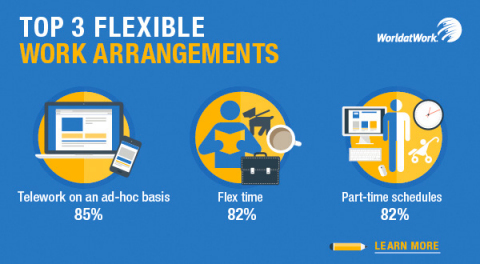WASHINGTON--(BUSINESS WIRE)--According to new research by WorldatWork and FlexJobs, the majority of companies surveyed (80%) offer flexible work arrangements to employees. However, only 37% of those surveyed report they have a formal, written philosophy or policy to support employee flexibility options.
WorldatWork, a non-profit human resources association and FlexJobs, a leading online career site, released the findings of the new survey, “Trends in Workplace Flexibility”, on Tuesday, Oct 6 at a national roundtable discussion, “Rethinking the Workweek.” The forum took place at 9:00 a.m. at the National Press Club, 529 14th Street N.W., Washington, D.C. and included leading business executives, federal government agencies, policy makers and invited guests who shared the real-life challenges that threaten workplace flexibility.
According to the survey, mastering a culture of workplace flexibility is not something that organizations do on the first or even second try. It’s an evolutionary process that occurs as employees tap into what they need to achieve work-life effectiveness.
By far, the most prevalent flexibility programs offered are telework days on an ad-hoc basis, flex time and compressed workweeks. From 2011 to 2015, flexibility programs have varied according to the type of program offered and the organization’s demographics, industry and culture. Additionally, 41% of those surveyed report that access to flexible work arrangements is not widespread to all employees. (See Figure 29 of the survey report.) Frequently, only a small portion of managers (42%) accept the idea that flexibility is an essential element to organizational success. (See Figure 26.) Only 3% of organizations attempt to quantify the return on investment (ROI) of flexibility programs by measuring productivity, employee engagement and performance ratings. (See Figure 33.)
“Top employers today understand the valid reasons for creating new ways of working, however we’re still witnessing a lack of training and resistance from management,” said Anne C. Ruddy, CCP, CPCU, president and CEO of WorldatWork. “Without a formal program in place, it’s difficult to measure flexibility’s effectiveness. Until that happens, companies will not see cost saving benefits, productivity gains and increased employee retention, which all comes from workplace flexibility."
A few additional highlights from the 2015 survey:
- More than two-thirds of managers (67%) offer flexibility to all or most of their employees at their own discretion.
- 66% of organizations cover the purchase of laptops for their teleworkers, by far the most provided expense. (See Figure 19.)
- While many managers still find it difficult to estimate the productivity of teleworking employees, 48% believe teleworkers are equally as productive as in-office employees. (See Figure 20.)
- 44% of organizations do not feature or market flexibility as a key employee benefit when attempting to attract new employees. (See Figure 23.)
“Allowing ‘ad hoc’ flexible work options without oversight or intention isn’t a smart, long-term strategy for companies,” said Sara Sutton Fell, CEO and founder of FlexJobs. “The 80% of companies that offer flexible work casually are missing some key strategic possibilities. By formalizing flex-work programs and putting structure around them, they can track metrics, measure progress and quantify goals and outcomes. The most important part is to realize that work flexibility shouldn’t compete or erode business goals, but should support a healthier more productive and stronger bottom line when implemented proactively and strategically.”
WorldatWork conducted similar employee recognition program surveys in 2013 and 2010.
About WorldatWork®
The Total Rewards Association
WorldatWork (www.worldatwork.org) is a nonprofit human resources association for professionals and organizations focused on compensation, benefits and total rewards. It's our mission to help total rewards professionals achieve their career goals and influence their organizations’ success. We do so by providing thought leadership in total rewards disciplines from the world's most respected experts and fostering an active community of total rewards practitioners. Founded in 1955, WorldatWork has offices in Scottsdale, Ariz., and Washington, D.C., and is affiliated with more than 70 human resources associations across the United States and around the world.
About FlexJobs
Founded in 2007 by Sara Sutton Fell, FlexJobs (www.flexjobs.com) is the leading online service for professionals seeking telecommuting, flexible schedule, part-time and freelance jobs. With flexible job listings in more than 100 career categories and opportunities ranging from entry-level to executive, freelance to full-time, FlexJobs offers job-seekers a safe, easy and efficient way to find professional and legitimate flexible job listings. Having helped more than 1 million people in their job searches, FlexJobs has been featured on CNN, the Wall Street Journal, Forbes, Fast Company and Good Morning America, among hundreds of other trusted media outlets.





